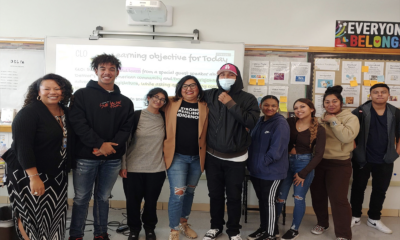By Laura Turner-Essel, PhD
As a mother of four children, I’ve done A LOT of school shopping. I don’t mean the autumn ritual of purchasing school supplies. I mean shopping for schools – pouring over promotional materials, combing through websites, asking friends and community members for referrals to their favorite schools, attending open houses and orientations, comparing curriculums and educational philosophies, meeting teachers and principals, and students who all claim that their school is the best.
But keep in mind – I’m not just a mom of four children. I’m a mom of four Black children, and I’m also a psychologist who is very interested in protecting my little ones from the traumatic experience that school can too often become.
For Black children in the United States, school can sometimes feel more like a prison than an educational institution. Research shows that Black students experience school as more hostile and demoralizing than other students do, that they are disciplined more frequently and more harshly for typical childhood offenses (such as running in the halls or chewing gum in class), that they are often labeled as deviant or viewed as deficient more quickly than other children, that teachers have lower academic expectations of Black students (which, in turn, lowers those students’ expectations of themselves), and that Black parents feel less respected and less engaged by their children’s teachers and school administrators. Perhaps these are some of the underlying reasons that Black students tend to underperform in most schools across the country.
The truth is that schools are more than academic institutions. They are places where children go to gain a sense of who they are, how they relate to others, and where they fit into the world. The best schools are places that answer these questions positively – ‘you are a valuable human being, you are a person who will grow up to contribute great things to your community, and you belong here, with us, exploring the world and learning how to use your gifts.’ Unfortunately, Black children looking for answers to these universal questions of childhood will often hit a brick wall once they walk into the classroom. If the curriculum does not reflect their cultural experiences, the teachers don’t appear to value them, and they spend most of their time being shamed into compliance rather than guided towards their highest potential, well…what can we really expect? How are they supposed to master basic academic skills if their spirits have been crushed?
Here’s the good news. In my years of school shopping, and in the research of Black education specialists such as Jawanza Kunjufu and Amos Wilson, I have found that there are some educational approaches that consistently provide a safer, more enriching, and more affirmative environment for Black children. The Montessori method, developed by Italian physician Maria Montessori and introduced to the U.S. in the early 20th century, is one such approach.
The key feature of Montessori schooling is that children decide (for the most part) what they want to do each day. Led by their own interests and skill levels, children in a Montessori classroom move around freely and work independently or with others on tasks of their own
choosing. The classroom is intentionally stocked with materials tailored to the developmental needs of children, including the need to learn through different senses (sight, touch/texture, movement, etc.). The teacher in a Montessori classroom is less like a boss and more like a caring guide who works with each child individually, demonstrating various activities and then giving them space to try it on their own. The idea is that over time, students learn to master even the toughest tasks and concepts, and they feel an intense sense of pride and accomplishment because they did it by themselves, without pressure or pushing.
I think that this aspect of the Montessori method is good for all kids. Do you remember the feeling of having your creativity or motivation crushed by being told exactly what to do, when to do it, how to do it, and why? The truth is that when presented with a new challenge and then given space, children actually accomplish a lot! They are born with a natural desire to learn. It is that spirit of curiosity, sense of wonder, and excitement to explore that Montessori helps to keep alive in a child. But that’s not the only reason that I think Black parents need to consider Montessori.
Fostering a love of learning is great. But more importantly, I think that Montessori students excel at learning to love. It begins with Montessori’s acknowledgement that all children are precious because childhood is a precious time. In many school systems, Black children are treated like miniature adults (at best) or miniature criminals (at worst), and are subjected to stressful situations that no kids are equipped to handle – expectations to be still and silent for long periods, competitive and high-stakes testing, and punitive classroom discipline. It’s easy to get the sense that rather than being prepared for college or careers, our children are being prepared to fail. Couple this with the aforementioned bias against Black children that seems to run rampant within the U.S. school system, and you end up with children who feel burned out and bitter about school by the time they hit 3rd grade.
In my experience, Montessori does a better job of protecting the space that is childhood – and all the joy of discovery and learning that should come along with that. Without the requirement that students “sit down and shut up,” behavioral issues in Montessori classrooms tend to be non-existent (or at least, the Montessori method doesn’t harp on them; children are gently redirected rather than shamed in front of the class). Montessori students don’t learn for the sake of tests; they demonstrate what they’ve learned by sharing with their teacher or classmates how they solve real-world problems using the skills they’ve gained through reading, math, or science activities. And by allowing children a choice of what to focus on throughout the day, Montessori teachers demonstrate that they honor and trust children’s natural intelligence. The individualized, careful attention they provide indicates to children that they are each seen, heard, and valued for who they are, and who they might become. Now that’s love (and good education).
As a parent, I’ve come to realize that many schools offer high-quality academics. Montessori is no different. Students in Montessori schools gain exposure to advanced concepts and the materials to work with these concepts hands-on. Across the nation, Montessori schools emphasize early literacy development, an especially important indicator of life success for young Black boys and men. Montessori students are provided with the opportunity to be
successful every day, and the chance to develop a sense of competence and self-worth based on completing tasks at their own pace.
But I have also learned that the important questions to ask when school shopping are often not about academics at all. I now ask, ‘Will my children be treated kindly? Will they be listened to? Protected from bias and bullying? Will they feel safe? Will this precious time in their lives be honored as a space for growth, development, awe, and excitement? Will they get to see people like them included in the curriculum? Will they be seen as valuable even if they don’t always ‘measure up’ to other kids on a task? Will they get extra support if they need it? Will the school include me in major decisions? Will the school leaders help to make sure that my children reach their fullest potential? Will the teacher care about my children almost as much as I do?’
Consistently, it’s been the Montessori schools that have answered with a loud, resounding ‘Yes!’ That is why my children ended up in Montessori schools, and I couldn’t be happier with that decision. If you’re a parent like me, shopping for schools with the same questions in mind, I’d urge you to consider Montessori education as a viable option for your precious little ones. Today more than ever, getting it right for our children is priceless.


 #NNPA BlackPress4 weeks ago
#NNPA BlackPress4 weeks ago
 #NNPA BlackPress4 weeks ago
#NNPA BlackPress4 weeks ago
 #NNPA BlackPress4 weeks ago
#NNPA BlackPress4 weeks ago
 Activism3 weeks ago
Activism3 weeks ago
 Activism2 weeks ago
Activism2 weeks ago
 Activism2 weeks ago
Activism2 weeks ago
 Activism2 weeks ago
Activism2 weeks ago





























































